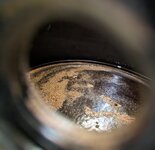So my house has a Rheem Water Heater (82V80-2) MFGed on 3/2006.
3 Years ago Replaced the Sacrificial Anode
2 Years ago the Dielectric Nipple Rusted out flooded my garage, Fixed that.
Now, the Water was not Hot when its cold out, Just installed new elements/thermostat, hopefully fixed.
I cleaned the inside as much as I could in a reasonable amount of time with a Wet Vac and peaked into the tank.
To my complete surprise the thing looks mint, I was expecting to see a rust mess and looking through both element holes I could not see anything that looked bad.
Knock on wood I get few to many more years of service from this water heater.

3 Years ago Replaced the Sacrificial Anode
2 Years ago the Dielectric Nipple Rusted out flooded my garage, Fixed that.
Now, the Water was not Hot when its cold out, Just installed new elements/thermostat, hopefully fixed.
I cleaned the inside as much as I could in a reasonable amount of time with a Wet Vac and peaked into the tank.
To my complete surprise the thing looks mint, I was expecting to see a rust mess and looking through both element holes I could not see anything that looked bad.
Knock on wood I get few to many more years of service from this water heater.

